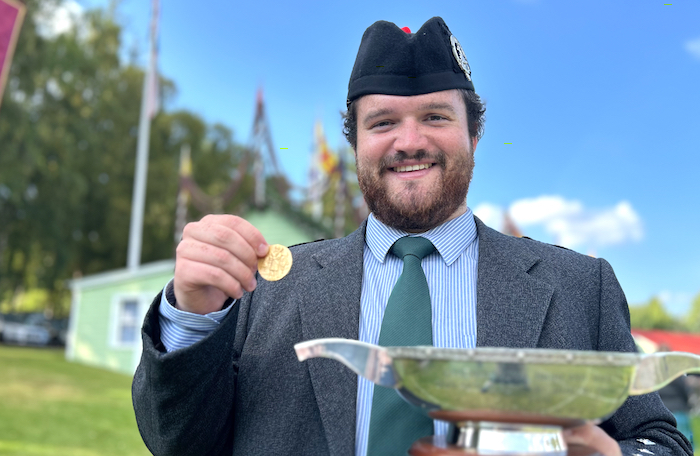
It is seldom that we assemble for breakfast at Braemar the pavilion filled with chat about sun cream. Yet that was the pleasant concern abroad as we judges met for our morning repast. Blue skies, hot sun, pine tree shade, mountain air… and the prospect of some excellent pipe music put a zest into the bacon and eggs and a spring into the heels as we made our way to our various benches.
Professor Watson of Ballochbuie University, double winner of the Braemar Medal in 1976 and ’77, led Logan Tannock and I to the piobaireachd hollow adjacent to the main games arena. On any day it is an ideal situation, with benches for listeners and a microphone and loudspeaker for the announcer.
By The Editor
Seventeen entered, 15 played. Eight tunes required. Numbers, usually in the high 20s, were down. Most North Americans and New Zealanders over for Oban and Inverness had gone home. For the past while Braemar has been the day after the Northern Meeting; this year it was a week after.
First on was Matt Pantaleoni from St Louis, Missouri, a previous winner of Braemar Gold. Tuning up with variations from In Praise of Morag, the pipe, finger and phrasing were clearly in top form. Then he started his Clanranald’s Salute, played one bar, played a wrong note – and played no more. What a shame.
Christopher McLeish found no riches in the Cave of Gold I’m afraid. The pipe didn’t quite last and the tempi were too samey. Next we had another Braemar Gold Medallist, Anna Kummerlöw from Germany. Her tune was the Battle of Waternish. This was well presented with good phrasing throughout. The pipe bright, there was one catch in the dithis and a missed taorluath.
Uncharacteristically she played much of the latter part of her tune close to the tent canvas with her back to the judges. As a consequence the chanter and technique were rather muffled, the sort of effect you might get if you stuffed a cloth into the Auspuffrohr of your Merc.
Mike Fitzhenry played the Earl of Ross’s march and was going along fine on a good pipe until he forgot where he was. Gordon Barclay had technical errors in MacSwan of Roaig (hiharin, chirps high G to low A) but generally good timing. Andrew Hall’s pipe was weak on the top hand, particularly F. Might have been caused by the hot, dry, weather.
Lee Taylor took an age to tune and his pipes were no better at the end than when he began. The tune was the lengthy Lament for the Union and I think Lee should try some easier pieces at this stage of his piobaireachd journey. James MacHattie was a serious contender. Nice tempo changes throughout Black Donald and a good, steady instrument. In the urlar and Thumb he was early with the gracenote after the grip and also to the throw to F in the second phrase. Greig Canning: nice pipes and fingers but failed to express the middle beat of his tune, the Gathering of the MacNabs.
As all Balmoral-ologists know, there is a cairn dedicated to the memory of RB Nicol and RU Brown right next to the piobaireachd board at Braemar. On the cairn is a plaque with some words and a few notes from the tune, the Glen is Mine. It was apposite, therefore, that we should give that tune to John McDonald to play. He handled it very well on an excellent pipe. Variation three was a bit nippy for my taste and there was a tightening of the finger towards the end.
Edward Gaul had an unsure high G and you cannot have an unsure high G in the Earl of Seaforth. Eddie will do much better with a better pipe. The staggered Bs at the start of I Gave a Kiss to the King’s Hand in no way detracted from a very fine performance by Angus MacPhee. On the best bagpipe of the day, he was technically good and musically not far behind. He could have moved the dithis doubling on a fraction more and the crunluath was a little sticky to start with (too much bottom hand). But once he revved things up it provided a fitting climax to this uplifting piece.
Andrew Hutton from Canada also had a nice pipe. He missed a chedari and was too long on the note before the cadences in Var 2 of the Viscount of Dundee. Good potential in this piper; he’s not far away.
On this occasion James MacPetrie was, I’m afraid. James can play so much better than this. Embari, chedari and the hiharin were surprisingly flawed and would have roused young Padruig Seumas rather than sent him off to his slumber.
Last to play was that gifted young piper Andrew Ferguson. He began his piping career at primary school with Logan Tannock as his tutor. Clearly well-taught, his fine technique shone through but unfortunately Beloved Scotland was below the required interpretive standard.
A glance at the watch showed 4.15pm. The day had been very well stewarded by Rae. Five minutes of detailed analysis produced this unanimous result:
Braemar Gold Medal Piobaireachd, September 7, 2024 – 1 Angus MacPhee 2 John McDonald 3 Anna Kummerlöw 4 James MacHattie 5 Greig Canning 6 Andrew Hutton. Full results here.
-
10 Tutor Books for Schools/ Bands/ Trade£105.00
-
Bagpiper’s Handbook – Handy Maintenance Tips£10.50
-
Pipe Chanters – Solo Poly or Solo BlackwoodPrice range: £130.00 through £265.00